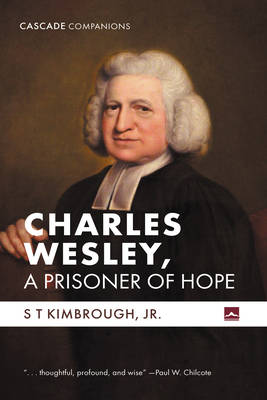
Bedankt voor het vertrouwen het afgelopen jaar! Om jou te bedanken bieden we GRATIS verzending (in België) aan op alles gedurende de hele maand januari.
- Afhalen na 1 uur in een winkel met voorraad
- In januari gratis thuislevering in België
- Ruim aanbod met 7 miljoen producten
Bedankt voor het vertrouwen het afgelopen jaar! Om jou te bedanken bieden we GRATIS verzending (in België) aan op alles gedurende de hele maand januari.
- Afhalen na 1 uur in een winkel met voorraad
- In januari gratis thuislevering in België
- Ruim aanbod met 7 miljoen producten
Zoeken
€ 41,95
+ 83 punten
Uitvoering
Omschrijving
Although Charles Wesley is known primarily as a distinguished English-language hymn writer and joint leader with his brother John of the Methodist reform movement within the Church of England, this book examines how the struggles and difficulties he faced as a child and as an adult shaped the person he was ever becoming. It explores how he was shaped by the love and conflicts of his family, conversion, the struggles of the Wesleyan movement within itself and within the Church of England, of marriage, parenthood, outreach to the poor, Scripture, the Book of Common Prayer, and the vows taken at his ordination. How did these struggles and the gospel itself mold the language of his hymns, theology, preaching, and daily life? How he dealt with them as a brother, pastor, husband, father, and friend is vitally important for pastors today and very valuable for an understanding of his hymns and poems. Charles called himself a prisoner of hope whom "God is able to save to the uttermost, to break my bonds in sunder and bring deliverance to the captive." A study of his struggles and how he dealt with them no longer lets us refer to him merely as "the hymn writer."
Specificaties
Betrokkenen
- Auteur(s):
- Uitgeverij:
Inhoud
- Aantal bladzijden:
- 230
- Taal:
- Engels
- Reeks:
Eigenschappen
- Productcode (EAN):
- 9798385242979
- Verschijningsdatum:
- 6/10/2025
- Uitvoering:
- Paperback
- Formaat:
- Trade paperback (VS)
- Afmetingen:
- 127 mm x 203 mm
- Gewicht:
- 231 g

Alleen bij Standaard Boekhandel
+ 83 punten op je klantenkaart van Standaard Boekhandel
Beoordelingen
We publiceren alleen reviews die voldoen aan de voorwaarden voor reviews. Bekijk onze voorwaarden voor reviews.









